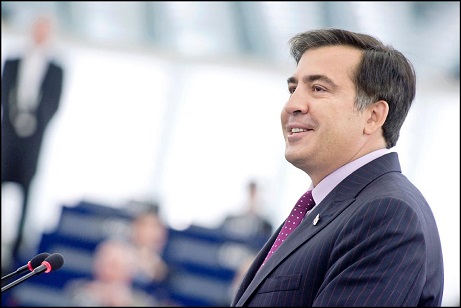Charges strengthened against Saakashvili ordering Gelashvili attack

Criminal charges have been strengthened against the country’s former President Mikheil Saakashvili for organising a physical attack on Valeri Gelashvili in 2005, which left the opposition Member of Parliament with life-threatening injuries.
"Based on the joint health expertise of Georgian and Lithuanian colleagues it was revealed that [Gelashvili] suffered severe injuries on his body that was life-threatening,” the Chief Prosecutor’s Office said today, November 10.
Initially health experts claimed Gelashvili only suffered minor injuries.
Nine years later on August 5, when the Chief Prosecutor’s Office first filed charges against Saakashvili for organising the vicious attack, it said Gelashvili suffered many injuries in the attack.
The strengthened charges related to the 2005 attack on Gelashvili, who was severely assaulted by armed, masked men in Tbilisi.
In today’s statement, the Office said an investigation into the Gelashvili case was ongoing under Article 25-117 of the Criminal Code of Georgia, which related to intended physical abuse causing severe health injuries on a person. The charge carried a prison sentence of 14 years.
Initially the investigation was completed under Article 333 of the Criminal Code of Georgia, which related to exceeding official powers. The charge carried a prison sentence from three to eight years.
Also today, the Office claimed Vano Merabishvili, the then Interior Minister and former top officials Erekle Kodua and Gia Siradze, will face similar aggravated charges in the same case.
Moreover, Kodua and Siradze were also charged with robbing Gelashvili, in particular for stealing "expensive personal belongings and a large amount of cash”.
International legal experts recommend continuing prosecution of Saakashvili
On October 23, 2014, the Chief Prosecutor’s Office of Georgia published the preliminary conclusion of a report by the International Prosecution Advisory Panel on the Gelashvili case.
The foreign experts noted the existing material was legally and factually sufficient to proceed with the prosecution of Saakashvili, Merabishvili, Kodua and Siradze for various offences relating to the physical assault on Gelashvili on July 14, 2005.
"We believe that you should continue your investigation and move towards trial, where any remaining issues will be addressed during the adversarial process,” read the experts’ pre-conclusion, published on Chief Prosecutor’s Office official website.
International Prosecution Advisory Panel members came to its conclusion after months of reviewing materials relating to the 2005 assault.Case: Attack on Gelashvili
The Chief Prosecutor’s Office of Georgia claimed Saakashvili ordered the attack on Gelashvili after the opposition MP gave an interview with local newspaper Resonansi on June 29, 2005, where he made comments about the personal life and construction of the former President’s residence.
In the interview Gelashvili, who was a lawmaker from ruling Georgian Dream (GD) parliamentary majority group, also accused the former president of unlawfully confiscating his property without compensation. In retaliation, Saakashvili allegedly ordered the revenge attack.
According to the Office, Saakashvili ordered the then Minister of Defence Irakli Okruashvili to physically abuse Gelashvili however Okruashvili refused.So Saakashvili then instructed Merabishvili to attack Gelashvili. Merabishvili accepted the offer and together with Kodua, who was head of the Special Operative Department subordinated to the Minister of Interior Affairs, carried out the attack on Gelashvili on July 14, 2005, the Office claimed.
The initial investigation into the attack on Gelashvili was launched the same day the attack happened. Despite this, the Office claimed no effective investigative actions were carried out in the initial investigation with the view of establishing the objective truth in the case. Tweet
Tweet  Share
Share